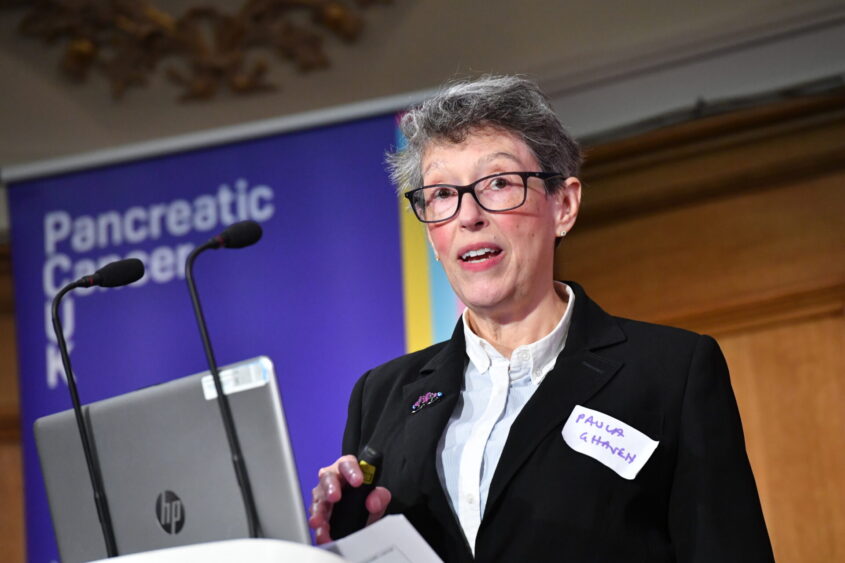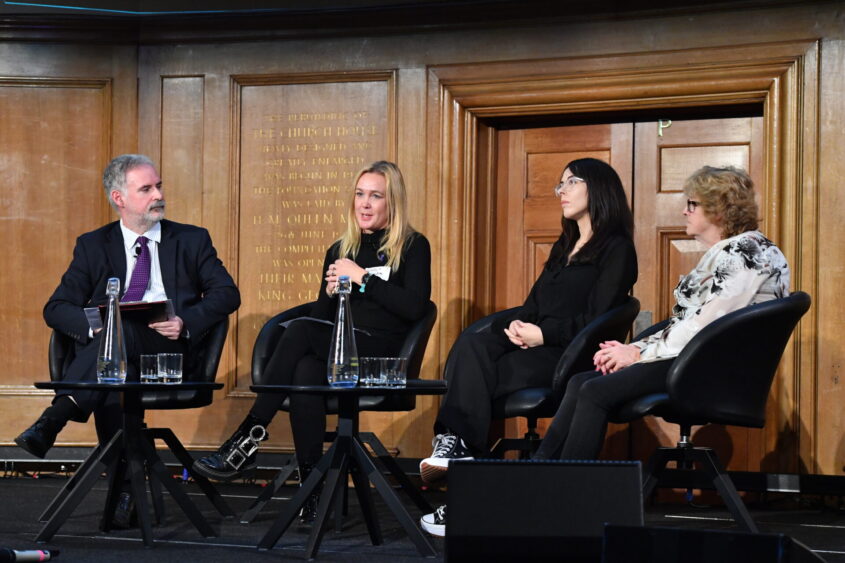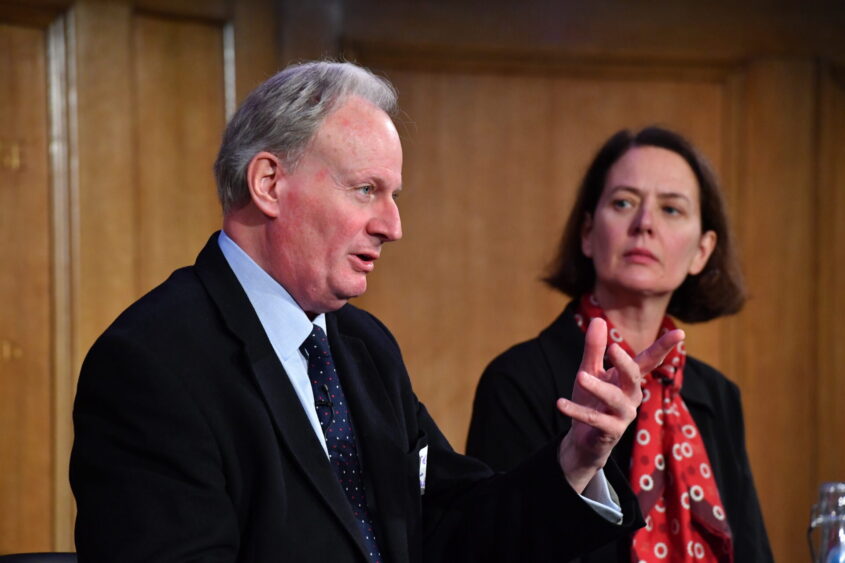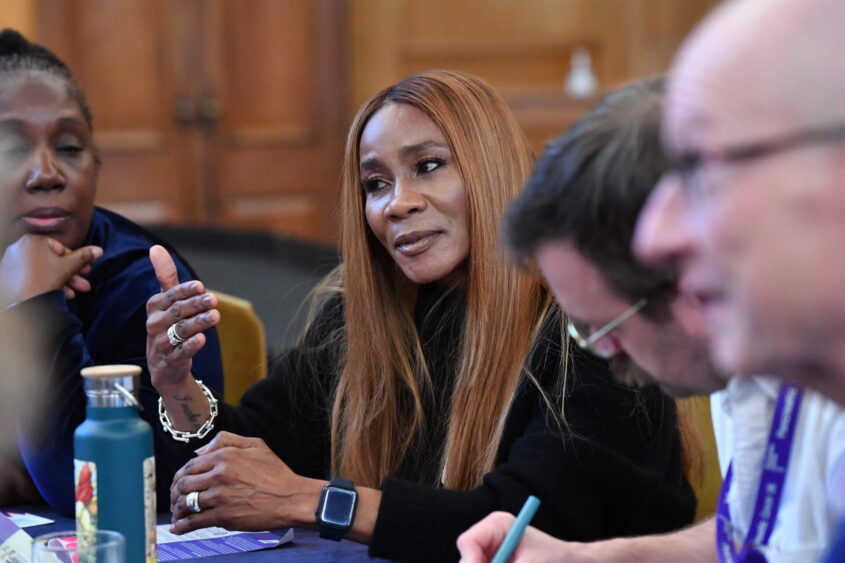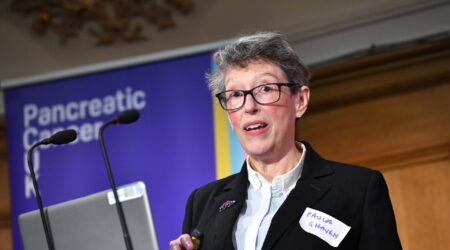

Pancreatic Cancer UK’s Improving Pancreatic Cancer Care launch event 2023
Pancreatic cancer is tough to detect
Pancreatic cancer is tough to detect – but even once it’s spotted, people can go on to face potentially huge obstacles: from getting their diagnosis, treatment and care – to having a better quality of life, and surviving. We also know people with pancreatic cancer face a postcode lottery of care. We’re determined to standardise and drive improvements in diagnosis, treatment and care to ultimately ensure that people with pancreatic cancer live well, for as long as possible and have the best chance of survival.
Over the last 2 years, here at Pancreatic Cancer UK we‘ve undertaken a UK-wide programme of work aiming to drive improve pancreatic cancer healthcare services. Through this initiative, we‘ve brought together healthcare professionals, health service development experts and people with a personal connection to pancreatic cancer, to agree as one unified voice on what a better and fairer standard of care looks like across diagnosis, treatment and care for people with pancreatic cancer and their loved ones.
Thursday 19th October 2023
On Thursday 19th October, as a community, we launched our vision for a faster, fairer pathway with an event in London. This event was a unique opportunity to bring together a wide range of experts, including people with personal connection to pancreatic cancer, to launch our recommendations on what needs to happen to improve care for people with pancreatic cancer and their loved ones and to discuss how we can work together to make these improvements a reality.
The same day marked the launch of our Don’t Write Me Off campaign which calls on governments across the UK to fund a faster and fairer Optimal Care Pathway for pancreatic cancer.


Dr Georgia Papacleovoulou, Health Intelligence and Improvement Lead at Pancreatic Cancer UK shares her insights and takeaways from our event ‘Improving Pancreatic Cancer Care’ event.
“I am really honoured to have worked with over 300 people with personal connection and health professionals in the last two years to develop the first ever consensus on what a fully funded faster and fairer pathway should look like across the UK. It’s been beyond words to witness such a vibrant and engaging audience at our launch event on the 19th of October.”
“It was a truly UK-wide perspective through representation of government and NHS officials, health professionals, health professional and regulatory bodies, industry representatives and people affected by pancreatic cancer coming together to commit to improving the experiences and outcomes of people with pancreatic cancer everywhere in the UK.“
Pancreatic Cancer UK’s Improving Pancreatic Cancer Care launch event struck a perfect balance between patient voice, clinician insight and a real four-nations approach.
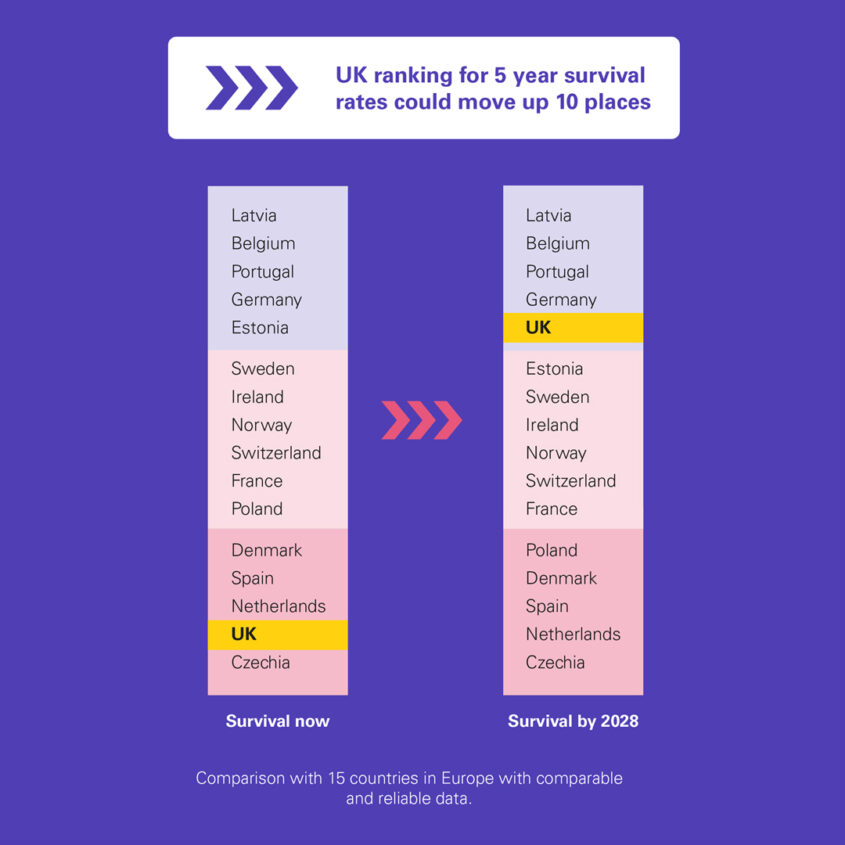

There was a real sense of hope and optimism in the room.
A raft of national health improvement programmes are being undertaken across the UK which, alongside the Optimal Care Pathway, could be game changing. There are examples of excellent practice in pancreatic cancer care delivery which we can all learn from. Now, we must build on this momentum and appetite for change, to drive forward real-world improvements.
The UK can become the leading country in improving pancreatic cancer five-year survival – from one of the worst, standing at 7% now, to one of the best in the world, at over 10%, if our proposed pathway is implemented.
Ultimately, this will ensure that people with pancreatic cancer live well and for as long as possible, and have the best chance of surviving.
People with pancreatic cancer need a #FasterFairerFunded pathway through their diagnosis, treatment and care.
Pancreatic Cancer UK’s Improving Pancreatic Cancer Care launch event in pictures.
The event was opened by Professor Paula Ghaneh, (image one, above) Chair of the Optimal Care Pathway initiative. Paula is a Professor of surgery and honourary consultant surgeon at the University of Liverpool and has been a driving force of this initiative from day 1.
Paula introduced our recommendations for a faster, fairer pathway for people with pancreatic cancer. Our Optimal Care Pathway calls for a faster and fairer pathway for people with pancreatic cancer.
- People with pancreatic cancer should receive a confirmed diagnosis within 21 days of referral and first treatment should be started within 21 days of confirmed diagnosis. This makes it a 42-day timeframe from referral to starting treatment – that is faster than the current 62-day timeframe currently in place.
- Alongside this, everyone with pancreatic cancer should be supported by a team of expert professionals, to guide them through their care.
The patient voice is at the heart of inspiring change
At the start of the day, we heard from multiple patient and carer representatives (image two, above) from across the UK who had incredibly varied experiences of pancreatic cancer. It highlighted the huge impact that pancreatic cancer has, not just on someone with a pancreatic cancer diagnosis, but on their friends, family and loved ones too. We also heard how different experiences can be, depending on how quickly someone can be diagnosed and access the right treatment and care. This can be lifesaving and should be the standard of care, everywhere.
I was very impressed by how involved patients and carers were in the event. It is very powerful to hear their voices.
Unifying forces to deliver national pancreatic cancer programmes in the UK is key to maximise their impact
National improvement programmes are being undertaken across the UK. These include the Northern Ireland pancreatic cancer audit, the Scottish Hepato-pancreato-biliary Network Pathway Improvement Project, the National Pancreatic Cancer Audit for England and Wales and the Getting It Right First Time for pancreatic cancer in England.
Engaging with these workstreams will be crucial to ensuring they produce meaningful outputs which lead to real-world improvements in healthcare services.
Adopting a collaborative, cross-nation approach to knowledge-sharing from these initiatives will play a pivotal role in securing lasting impact. Together, we can advocate for sustained improvements in the long-term, speaking with one unified voice.
There are powerful examples of where better standards of care exist locally and nationally
Throughout the day, we heard from health professionals about outstanding clinical practices taking place across the UK. These encompassed the entire patient pathway, featuring implementation of a faster diagnostic pathway, the adoption of tools for more effective and standardised treatment decision making and models of personalised and enhanced supportive care. It was truly inspiring to hear about the commitment health professionals have to improving services and making the case to commissioning bodies to implement changes.
Now we need to work together to share good practice and make these improvements a reality in every corner of the UK.
The new concepts in PACT Radiology Template for standardising reporting was excellent and much overdue. We need to take best practices from the four nations and combine our best brains and practices to enhance patient outcomes and experience.
What’s next for this initiative
I left the event feeling inspired for the next phase of this work – to actively advocate for the implementation of our clinically supported, evidence-based recommendations, ensuring better and fairer standards of care for people with pancreatic cancer.
As a charity, we hold a unique position to drive this forward. Through calling on governments across the UK for a #FasterFairerFunded pathway everywhere and supporting local health systems and health professionals in bringing about these crucial changes.
Thank you so much to all those who joined us at this event to explore how we can make these improvements a reality. A very special thank you also to our incredible expert pancreatic cancer community who have worked with us to develop this pathway. Without you, none of this would be possible.


